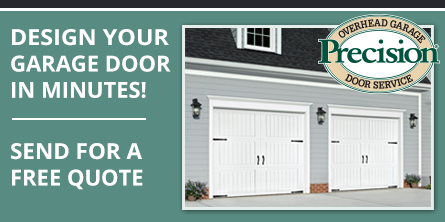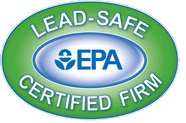Buyer's Guide Materials





WITH 4,022 REVIEWS
Click Here To Book Online Now





CLICK
To view local phone numbers


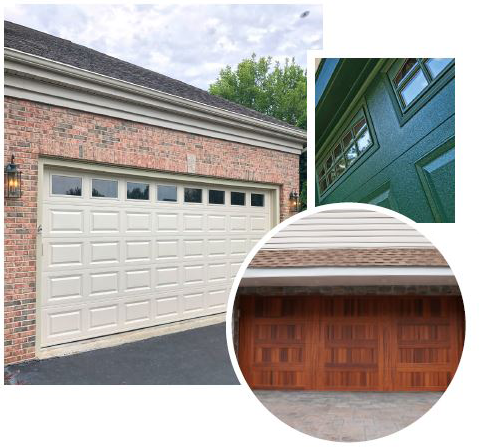
Steel
Steel is one of the most traditional garage door materials. Large rolls of steel travel through machines that emboss a wood grain onto the door then stamp one of the various designs into the steel. The wood grain actually adds stability to the door. However, the manufacturing process of stamping does limit the design choices of those looking for a standout door.
Steel is a low maintenance material aside from routine inspection. It's durable in that it is fade-resistant. However, it is susceptible to rust and dents, so you’ll need to take that into consideration when shopping materials.
Vinyl
Vinyl garage doors are typically used when a homeowner wants the simplicity of a traditional garage door, but lives near the shore where having a steel door will lead to rust within the first year. They are easy to maintain as a wipe down a few times a year can keep them looking and working great. For many homeowners, vinyl is a top choice for garage door materials because it is incredibly durable and can withstand dents, the elements, and everyday wear.
When choosing a vinyl garage door, customization options are limited. There are fewer color and design options than a steel and vinyl composite. But for the homeowner who is less concerned with unique elements and more interested in durability, this is the right door for you.

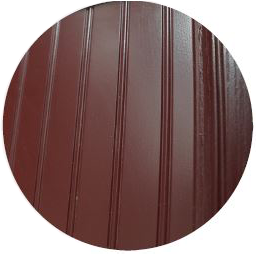
Fiberglass
Fiberglass is known for its ability to mimic wood, from the look to the stain. It has limited customization options and is offered in common designs and styles, but it makes up for it in durability.
This material is very resistant to insects, warping, dents, moisture, and changes in humidity, which make this garage door material a great choice for homes on the coast or in salty environments. However, it can fade over time after long exposure to the sun. Fiberglass is low maintenance, but it can be difficult to repair if a section is damaged.
Full Glass
Full glass garage doors offer a wow factor that is hard to beat. With a variety of glass options and frame color choices, full glass can really make the garage door a focal point. Glass isn’t a very durable material, so though it’s relatively easy to replace a broken glass section, it can become costly. Aside from keeping the glass clean, it doesn’t require much maintenance to keep it looking pristine. Due to the construction of full glass doors being nearly all glass, the frame can be insulated, though it doesn’t add much energy efficiency.
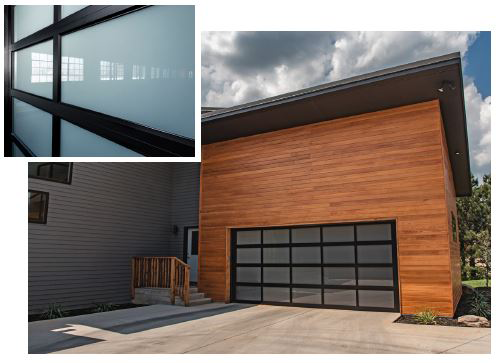

Wood Composite
Wood composites are a combination of resin and wood fillers which give them many of the qualities of wood without the headache. These specific types of composite, such as Extira and Tricoya, are manufactured to be used outside, and will vary by door manufacturer. Wood composites can be cut, routed, milled, stained or painted just like wood. This material offers total customization and can truly match any homeowner’s exterior design.
Wood composites are moisture resistant, which leads to less warping and cracking. This material can absorb heat better than others, so it’s often better for garage doors that face south and have harsh sun exposure as they can resist fading. It can resist termite damage, as well as swelling and shrinking.
Wood
Wood allows you to completely customize your garage door. You can choose from popular Wood Species such as mahogany and cedar or make even more unique choices with Douglas fir and reclaimed barn wood. Create a standout design, choose your finish, and you’ll have a custom one of a kind door made of high quality material. Wood can be cut, routed, and milled to meet any homeowner’s specifications and truly adds beauty to your home.
Wood garage doors come in stain grade or paint grade. Stain grade doors offer more rich, natural colors across the wood to maintain continuity as it’s stained. Paint grade doors usually have more knots and dark spots which won’t be visible once they are painted. Stain grade doors need to be refinished every 1-3 years depending on sun exposure while paint grade doors last about 5-10 years between refinishings.


If your door is not factory finished, it’s important they are stained or painted within 10 days to maintain a fresh appearance. It’s strongly suggested that you have your garage door stained by a reputable professional prior to installation. You can also opt to paint your wood garage door, depending on the wood species you choose.
Homeowners who desire wood doors, but need a lower price tag than a full custom wood door, might consider a wood overlay. In this case, unfinished wood planks are adhered directly to a steel door. Styles are limited and the boards will need to be maintained and finished in the same manner of a full wood door.
If you’re interested in the look, feel, and customizability of a wood garage door without the maintenance, you might want to consider a wood composite or vinyl composite garage door which can be stained to mimic wood grain.
Vinyl Composite
Vinyl composite doors are created by routing and milling cellular PVC, a malleable and more workable form of traditional PVC. It can be customized to create a one of a kind door that is durable and virtually maintenance free. A simple cleaning with your garden hose is enough to keep it looking great. Vinyl composite is rust-resistant, which makes it a great choice for seaside locations, as well as salt-, insect-, rot-, moisture-, and fungus-resistant.
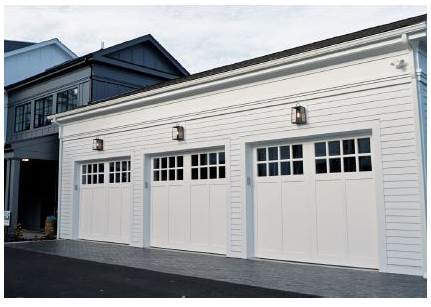

Vinyl composite garage doors allow homeowners the opportunity to create a completely unique door which makes vinyl composite so versatile and popular. It can be factory finished with a stain to look like wood or painted a variety of colors. However, vinyl composite does absorb heat quickly which restricts paint colors. Homes with southern facing garage doors are limited to lighter paint colors. If your garage door is painted, it shouldn’t have to be repainted or refinished unless it’s a darker color or gets a large amount of sun exposure (and it may not fade for over a decade or more!) Depending on the color of your door, you may be required to use a specially made paint by the manufacturer which is made to have Light Reflective Values.
Have a question? Give us a call!
...Stay tuned for next week's "Garage Doors in Plain English"
Office: (865) 233-8755
1774 W Lamar Alexander Pkwy
Maryville, TN 37801
Office: 865-229-8261
501 Hwy 321 N
Ste 2
Lenoir City, TN 37771
Office: 865-229-4361
4620 Old Broadway St.
Ste 101
Knoxville, TN 37918







